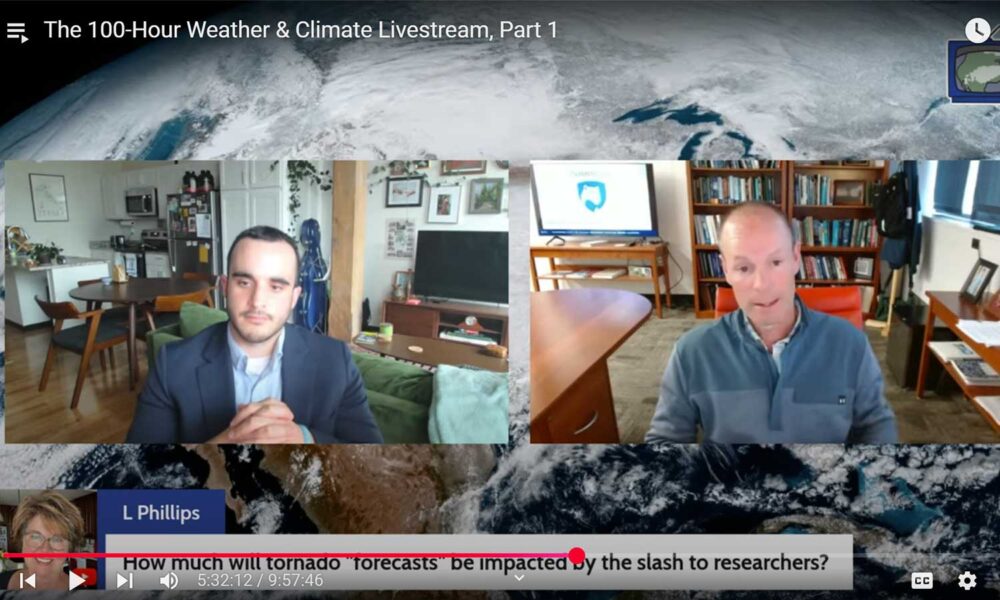Danger Season is well underway, yet the Trump administration continues to hack away at federal agencies that help us predict and survive fires, heat waves, and storms made more extreme by climate change. The Union of Concerned Scientists is fighting the administration’s irresponsible actions, and more scientists around the country are speaking out, too.
UCS Fellow for Climate Attribution Science Marc Alessi (above left) recently helped organize a massive livestream event in which nearly 200 scientists presented nonstop for 100 hours to make a case for the taxpayer-funded climate and weather data, tools, and jobs that keep us safe. The event, which drew attention to the administration’s cuts to research and the damage they will do, lasted five days from May 28 to June 1 and was featured in The New York Times and Fast Company.
“If the American public tunes in… they will see how our science benefits the public,” Dr. Alessi told CNN ahead of the livestream.
AAS: How did you come to be a climate scientist?
MARC ALESSI: The reason I’m in this field is because I’ve been obsessed with weather since I was four years old. As a kid, I was tracking hurricanes on Weather Underground (which was way ahead of its time in hurricane tracking tools) and watching the Weather Channel on TV. My first memory of a major hurricane was Hurricane Isabel making landfall in North Carolina in 2003. Pursuing that love, I went on to study and earn my PhD in atmospheric science.
AAS: How have weather and climate scientists stepped up in fighting cuts to federal agencies like the National Oceanic and Atmospheric Administration (NOAA) and others?
MARC ALESSI: In the past, scientists in our field published their data and analysis without much interaction with the public, but it’s good that they’re becoming better at reaching out to people and explaining the data. I have seen things I would never expect, like national meteorological societies issuing statements highlighting how detrimental these cuts will be to the weather and climate communities and the American public.
For example, the American Geophysical Union (AGU) issued a statement saying it “will endanger the health and well-being of all Americans,” to cut staff at NOAA, NASA, the National Science Foundation (NSF), and other agencies like the National Weather Service (NWS)—the people who issue watches and warnings in the face of severe weather. All five former NWS directors issued a statement saying the Trump administration cuts will lead to “needless loss of life.”
Meteorologists and climate scientists are stepping up and engaging the community more than they’re accustomed to, and I think that’s a good thing. They’re essentially saying, “We have no intent to be inefficient or wasteful with your taxpayer money, we’ve spent our whole lives making these forecasts, and we will continue to protect American lives and livelihoods.”
AAS: Tell us about your role in organizing the epic 100-hour weather and climate livestream.
MARC ALESSI: I helped organize the event. It was a public-facing, nonpartisan 100 continuous hours of meteorologists and climate scientists giving talks, involving the entire weather and climate prediction community from graduate students to senior professors to broadcast meteorologists. It was an event that finally allowed these scientists to organize and say: “This is what we do. Our work saves American lives, so our funding shouldn’t be cut—it should be protected and expanded.”
In mid-April, a friend who is a professor at Tufts University came up with the idea. Over the course of a month, it grew from a group of four organizers to 12. We had a lot of help and support from the entire meteorological and climate science community, and the event received a lot of media coverage. It was great to be part of this grassroots effort with everyone offering their services to make the livestream a success.
AAS: What were some highlights from the event?
MARC ALESSI: My favorite takeaway: we got over 180,000 views, and viewers called Congress over 15,000 times as a result of the livestream. I hope the event really pushed the needle to get Congress to step up and protect the National Weather Service and the rest of NOAA.
More personally, I also really enjoyed hosting a panel with two former NWS directors. When I was younger, I dreamed of leading the NWS one day. Just to hear their perspective was powerful. We also had an incredible panel of NOAA scientists talking about how their research directly impacts Americans that was very eye-opening.
AAS: Why do you think clear messaging about climate science hasn’t seemed to reach the public?
MARC ALESSI: There’s a gap between where we scientists communicate our studies and results and the general public. This event helped build a bridge and share what we do with the public. While there’s still a gap in messaging and communication, this event demonstrated that we as a community will do the best we can to fight for this funding that protects lives and livelihoods and the country’s economy. The messaging that stood out to me most was that almost every speaker highlighted how they were funded by the National Science Foundation or NOAA, and we would lose all of this research if it weren’t for these agencies.
AAS: How could cuts to agency budgets affect the future of meteorology and climate science in this country?
MARC ALESSI: Funding cuts make me the most nervous for younger/early career scientists. Even high schoolers and college kids interested in studying science will be affected: people of my generation and older ended up where we are because of the federally funded opportunities we had in undergraduate programs. For some people who are younger and just entering the field, that funding might be taken away.
One respected tornado scientist who spoke on the livestream said he wouldn’t be in this field unless he had done an internship funded through NOAA or NSF. We kept hearing that. These cuts could affect our scientific infrastructure for decades if this research doesn’t continue.
On the other hand, it is possible that for the next four years some weather and climate scientists will focus on something else. Meteorology and climate are very diverse fields. For instance, there are physicists and statistician-oriented folks who may focus on another field until funding is restored.
AAS: Can the private sector step up to replace federal agencies’ research and capabilities?
MARC ALESSI: If NOAA and NWS lose funding, private industry will step in to do these things, but that’s a dangerous slippery slope. They want to make a profit and will start charging for services that taxpayers have already funded.
Lower-income people in the US will lose data important for them to protect themselves from dangerous weather or climate events. That to me is frightening, and that’s why we need to make sure NWS and NOAA are fully funded—everyone needs it. It can’t be something only wealthy people can purchase. Furthermore, a lot of meteorology and climate centers around the world depend on NOAA’s observational data, and cutting that off will affect our understanding of climate change in the future. It would set us back.
AAS: What are next steps for the team you helped assemble for the weather and climate livestream?
MARC ALESSI: We may host a shorter version of a similar livestream once a year and post some talks on YouTube over the course of year or two—which is a good way to remind people to call their representatives. And we’re still fighting. The funding battle in Congress is still ongoing in the appropriations process.
AAS: What can everyone else do?
MARC ALESSI: We need to talk about what’s happening. When I talk to friends and family, they have no idea funding is being cut to climate science and meteorology, dismantling the NWS and NOAA’s research division. Taking a chainsaw to the entire meteorology and climate science infrastructure will have an effect on our prediction capabilities for decades. Congress controls the funding. The administration can say one thing, but it really comes down to what Congress does.
AAS: Why is it appropriate for scientists to also be activists?
MARC ALESSI: I think this is becoming a more universally accepted opinion. Scientists need to step up for their research. Our research is under threat right now. Sitting around and doing nothing is not helpful. We’re going to lose everything we love and everything we’ve worked on if we do nothing! Now is the time to become more of an activist and start fighting for our research, which is critical to protecting American lives and livelihoods.
The livestream gave me a lot of hope because of how engaged the meteorology and climate science communities became. We really do have a lot of power in how Congress decides to fund NOAA and NWS.

